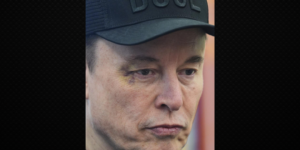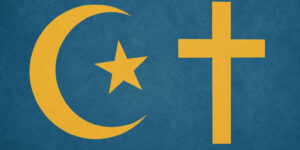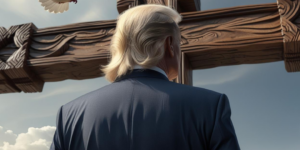Ulf Ekman Says Prophetic Word Confirmed His Catholic Conversion
Editor’s Note: The founders of Word of Life Church in Uppsala, Sweden—Ulf and Birgitta Ekman—have decided to become Catholics and be received into the Catholic Church. The idea of them leaving Word of Life was “the unthinkable thought,” they say. Still, that is what now will happen.
In an exclusive interview with the Swedish Christian newspaper Världen Idag (The World Today), the couple talks about the both long and difficult process, about how their view on Catholics and Catholic doctrine has changed, and about their strong attraction to the Catholic Church. The newspaper offered the story to Charisma News.
For a long time, there has been talk about Ulf Ekman drawing nearer the Catholic Church. For 15 years, he has been calling for the need for unity, not least with the historical churches, which has resulted in both conversation and speculation. When the Ekmans’ son, Benjamin, chose to convert last fall, the discussion gained momentum. Would Ulf and Birgitta go the same way? And the answer to that is yes. Exactly when this will take place, they keep to themselves, but they say it will happen “sometime during the spring.”
Ulf and Birgitta say their decision and that of their son, Benjamin, were made independent of one another—and that they were surprised when the son announced his resolve.
“For a long time we expected him maybe to join the Orthodox Church, as he has shown an interest in and really liked that church. But then he called one day last fall and told us of his decision to join the Catholic Church. And that really surprised us,” Birgitta says, adding that they are happy their son has found a spiritual home in the city of Lund, in southern Sweden.
Sometime during the fall, Ulf and Birgitta made the decision to become initiated into the Catholic Church. Even though their resolve to join the church is recent, the process has been long, they say.
“We have prayed, pondered, researched and asked the Lord for a long time,” Ulf says.
“Yes, it has been a process ever since the turn of the millennium,” Birgitta adds.
Their yearning for unity goes even further back in time. Ulf mentions an incident that happened at the end of the ’70s, where he was sitting in a restaurant with a schoolmate when he suddenly started to cry.
“I had an instantaneously experience of how Jesus feels about His church being divided,” he says. “It was like a flash, that this doesn’t please God and that Jesus mourns over this fact.”
The experience at the lunch restaurant then vanished from Ulf’s memory but returned during the past decade, he says. In the recent process, the discovery of unity has been very central and essential.
Ulf Ekman picks up his Bible and reads a verse from John 11:52, where the apostle John writes that Jesus would die “not only for [the Jewish] nation but also for the scattered children of God, to bring them together and make them one.”
“The bringing together and making them one is at the very core of the gospel,” he says. “We sometimes use the gospel to divide people, which I, too, am a part of. We probably don’t do it out of ill will but due to the fact we live in a very divided world. But I believe this is strongly on God’s heart, that we are to be united. Jesus died for this very reason.”
In the early days of Word of Life, there were some incidents where Ulf Ekman issued criticism against the Catholic Church, and the church prayed against Pope John Paul II’s visit to Uppsala in 1989.
“I wrote some critical articles,” he says. “We prayed that Sweden would protect its evangelical faith in conjunction with the pope’s visit to Uppsala, and I’ve taught some about it at our Bible school. But apart from that, which all happened on a really early stage, we haven’t devoted much time or effort to these issues. We have, however, definitely been part of the general negativism.”
Ulf defends himself against the image sometimes painted of him having been overly critical.
“This wasn’t a main issue for us. I was critical, but only in the same way as many other charismatics,” he says.
“There are rabid Catholic haters, but we’ve never been like that. We’ve been suspicious, as well as ignorant,” Birgitta explains.
Do you think people’s negative attitude against the Catholic Church is often based on ignorance?
“Yes, I definitely think so,” Birgitta says. “We’re not very much exposed to influences from the Catholic Church in Sweden. We thought of the Catholic Church here more as a minor ‘immigrant church’ that we didn’t come across much.”
They speak about their own process, where prejudices have come to naught and where they have had to revise their view on various Catholic doctrines. Birgitta says she felt she had been almost deluded upon discovering what was in the Catholic Church.
“When I found all these positive sides, I thought, ‘Why hasn’t anyone told me this? Someone must have kept this back from me and all other free-church Christians.’ I’ve had one aha experience after the other when studying it,” she says. “The reconciliation, healing, the belief in wonders—it’s all there very strongly and well formulated, though we don’t even know about it. So we’ve been standing there, blushing in shame when discovering our ignorance.”
Ulf says much of what he has encountered has provoked him and altered his view on the Catholic Church.
“When I read the Catholic social teaching, I found it contains everything I believe in,” he says. “When I read foundational dogmatics, I realized these were things that I’ve always believed in but that no one has been able to formulate that clearly.”
Birgitta compares the prejudices against the Catholic Church to the ones they themselves have been exposed to over the years at Word of Life.
“Members of Word of Life have suffered because others have gotten their information from the evening tabloids,” she says. “I began to realize we were doing the same thing in regards to the Catholic Church. We think we know, we’ve read anti-Catholic books, we have it all black on white. But truth is, it’s merely hearsay.”
She mentions the issue of Mary as an example. “Someone might say to a Catholic, ‘You worship Mary,’ and they object, ‘No, we don’t; Mary is a human, and we would never worship Mary like we worship God.’ It isn’t fair to judge a church or a movement on secondary sources. That’s why I’ve found it crucial to find out, from their own official writings, what they really say,” she says.
Ulf and Birgitta are very well aware of the fact there are some Catholic teachings that Protestant Christians have questions about. Last fall, Ulf wrote an article in the Swedish theological periodical Keryx that caught much attention, where he, among other things, raised the issue of the need for a teaching authority of the church that can settle a matter or dispute in cases of varying interpretations of the Bible. Ulf maintains that the need for such an authority is great.
“It’s utterly incomprehensible to me how someone could say we don’t need a teaching authority of the church. If we have five Bible scriptures and 18 opinions regarding them, who is to determine? Either it’s the fact that ‘My intellect is better than yours; I’ve studied more than you; I can persuade better than you can; I’m more passionate than you’ that makes my opinion win over yours. Or we have a teaching authority that says, ‘The rule book says this is how you settle this issue.’”
Can such a teaching authority take shape even in the evangelical church, or does it automatically point to the pope?
“There are seeds to this planted everywhere,” Ulf says. “God’s grace over the free churches and Protestant Christianity is amazing. God works in all members of the body of Christ.”
But you see the pope as the utmost expression for such an authority?
“Yes, he definitely is,” Ulf says. “Yes, I believe in the necessity of an ultimate instance.”
In the aforementioned Keryx article, Ulf also problematized the Reformation, describing it as “an ecclesiastical trend break,” where the view on the church, the ecclesiology, was entirely altered. Still, he claims the Reformation was necessary.
“There was a great need of a reformatory change,” he says. “But what happened was this evolved into a Protestant revolution, which became polarized from both sides. And here we find the great rift. The result was the abolishment of the teaching authority, and the continuity was broken off very clearly. People tried to start over.”
Ulf sees a need for continual reformation but questions the necessity to start over each time.
“The result of this reboot at the time of the Reformation wasn’t only what we have been taught—that the church now became freer and better—but that the church rather became more secularized and divided,” he says. “Eventually, the ecclesiology was watered down and the Christian belief individualized.”
If the Reformation resulted in the division that Ulf Ekman sees, it has since then continued throughout various revival movements, he claims.
“There’s an idea throughout revival history to ‘move off’ and leave something because the others aren’t pure enough. This has caused one division after the other. One probably thinks that if you do this, you refine and thus strengthen. But what we’ve found on our journey is that this isn’t true; you only become more limited,” he says.
The purpose of revival, or reformation, according Ulf Ekman, is to vitalize all of the body of Christ.
“God allows various revivals to spring forth because He wants to highlight and visualize something, which is wonderful,” he says. “But then He wants to incorporate this into the body of Christ. When the Pentecostal revival became a charismatic revival and was incorporated into the body of Christ in earnest, rather than being isolated, it became a blessing for all denominations. And now we have 120 million Catholic charismatics as a result.”
What is your view on the concept of Sola Scriptura?
“According to many, Sola Scriptura signifies the fact we believe in the Bible, which I of course agree with,” he says. “You could just as well say the primat of Scripture, meaning we put the Scripture first and foremost.”
Ulf and Birgitta say the discovery of the importance of unity has caused a change in attitude toward other Christians, not least toward Catholics.
“The discovery of and the fellowship with them shook us up and provoked and challenged our own ignorance and prejudice,” Ulf recalls. “In our contact with Catholics, we realized how alive they are, how proficient and knowledgeable they are, how devoted they are and firm in their belief. These are things revival Christians sometimes claim to have a monopoly of, so for me it was a sobering experience to realize that, no, we don’t have monopoly of this.”
Ulf and Birgitta mention two people especially who have meant a lot to them in this ongoing process, the first one being the Swedish Catholic bishop Anders Arborelius.
“His life and example has spoken loudly to me personally, ever since the day he was ordained bishop in December 1999,” Ulf says. “If any Swede has meant a lot to us in this issue, it’s him.”
But also the Carmelite monk Wilfrid Stinissen, who lived in southern Sweden for 50 years until he recently moved to be with the Lord, has played a vital role in Ulf and Birgitta’s decision-making.
“He was a wonderful, wonderful friend and father to sit and talk with,” Birgitta recalls. “We miss him so much, for he really helped us.”
Ulf and Birgitta sum up the reasons to their decision. “For us, this has been a revelation on many levels, finding vivid Catholic people, a strongly anchored biblical theology, a rich and vibrant order of worship, powerful missions work, a social pathos and an ethical strength and stability. All these things collectively have had a strong power of attraction on us,” Ulf explains.
When speaking of unity, many people probably think of something relational rather than something organizational. What’s your view on that?
“All Christians like unity, but we mean so many different things by it,” Ulf says. “It’s great to have a good relation with people in other denominations, to surmount differences and stop bickering. And even if you can’t agree, you can still have a conciliatory and objective attitude toward each other. This is a good and necessary effort—but it’s not enough.”
Isn’t it enough that we love one another?
“That’s what people living in cohabitation say today, too,” Ulf says. “But Jesus doesn’t have 20,000 wives, and He doesn’t cohabit with one, either, but there’s a concrete inner and outer relationship with one bride.”
So, we need an organizational unity?
“This goes back to ecclesiology, to which view on the church you have,” he says. “The church is the body of Christ, a structural unity. It’s concrete; it’s clearly defined; it’s tangible. It isn’t a cloud of gas but has both an outside and an inside, body and Spirit. And the body is visible. Jesus walked around for 30 years and was visible. In the same way, the church must have a concrete expression.”
“And how was it in the beginning? We charismatics love to say we’re going back to the Christianity of the book of Acts. And at that time, there was only one church,” Ulf adds, laughing.
One consequence of the couple’s decision to be initiated in the Catholic Church is that Ulf and Birgitta are now leaving Word of Life. They are retiring from all board assignments (except for Birgitta Ekman’s Fund for Indian Children, which Birgitta will continue working with, aiding destitute children in India) and leaving the church as members.
The mere idea of leaving the church they love surely hasn’t made the Ekmans’ decision easy.
“We’ve been wrestling with this for a long time—all in secret—as we love all our friends in Word of Life,” Birgitta says. “I mean, we started all this. To leave this and go somewhere else is really the unthinkable thought. We really don’t want to hurt anyone, not frighten anyone or depreciate anyone. So, of course, this has been a huge hump in the road.”
However, their conviction still led them to make their decision.
“We’ve talked, pondered and asked Jesus for help in what to do with all this,” Birgitta says. “Because we realize that we do believe in the Catholic Church, and we believe it originates from Jesus and the apostles. Consequently, it’d be painful not to be part of it. So what to do? It’s been a period of agony, but at one point you must make a decision.”
In order to be received into the Catholic Church, a person is required to study the Catechism, a book that Ulf claims to be “the best book he has ever read.” Ulf and Birgitta have studied this privately and in an unprejudiced way. That last aspect was important, they say.
“When we decided to go through this teaching, it wasn’t automatically connected to any kind of resolution. We could choose to finish all our studies and then say we weren’t interested,” Ulf says.
He recalls that at each important fork in the road of life, he has received a confirmation, often through a prophetic word. This time was no exception. Recently, the pope sent a greeting to a conference that Kenneth Copeland hosted in the U.S. The very same day, Ulf received a phone call from a preacher who had attended that meeting but who didn’t know anything about the situation the Ekmans were in.
“The man who called told me he had been to that meeting and then yelled over the phone, ‘God is saying to me: What you’re deciding to do is right. Your destination is right. What you feel you are to do, you should do. You are to go to the Catholics. You are to do what you’ve resolved to do,’” Ulf says.
This was yet another confirmation for Ulf and Birgitta to the decision they had already made.
What kind of reactions regarding this have you met from the board of Word of Life?
“One reaction: ‘Well, we’ve suspected this for a long time,’” Ulf says, laughing heartily.
“Ulf has been writing so much pointing this way, articles in Keryx and so on, so I guess it wasn’t very surprising,” Birgitta explains.
Still, the fact that a Pentecostal charismatic pastor of Ulf Ekman’s dignity decides to be initiated into the Catholic Church is something out of the ordinary. It’s probably historical.
Both Ulf and Birgitta make a point of underlining there isn’t any conflict in this decision but that everything is happening in concord with the Word of Life Church—and that this isn’t about disassociating themselves from something but rather recognizing and affirming a calling.
“There is no outer reason for me to leave Word of Life, that I’d grown tired or that there’d be a conflict of some sort,” Ulf says. “On the contrary, I get on wonderfully well. So it’s really very remarkable to make such a decision.
“The only logical reason to all this is that God has spoken to us about it and convinced us, deep down, that this is what we are to do. We feel that our task of 30 years now is finished. The Lord told us: ‘The task is fulfilled, but the friendship remains.’ So our relation to Word of Life will remain as long as we live, but it will, naturally, be different.”
The fact that Joakim Lundqvist has taken over as senior pastor also gives Ulf and Birgitta inner peace to move on.
“We’re so grateful that God gave Pastor Joakim to the church; he’s such a wholehearted and enthusiastic pastor. I mean, you do care for your children, you can’t just leave them,” Birgitta says.
“But it’s also important to say Joakim isn’t the solution for us being able to become Catholics,” Ulf adds. “However, I was able to think more clearly as soon as Joakim stepped in. When we had dedicated Joakim to become the senior pastor, this possibility was suddenly more palpable.”
Do you think more people will now go over to the Catholic Church as a result of your decision?
“This is something deeply personal for each and every one, so that isn’t something you could speculate in,” Birgitta asserts. “This is our thoroughly gone-through step, and then everyone must lead their own life with the Lord and take responsibility for it.”
The Ekmans don’t believe their resolution will be any kind of starting shot for “a long exodus,” and they make a point to emphasize that their own road now become detached, separated, from that of Word of Life.
“Of course, we have no problem with others from our church making the same discovery, for we believe it’s based on the truth,” Ulf says. “But the decision that we make is our own, and the road we now set out on is our own.”
At the same time, the Ekmans underline Word of Life’s continued important role in the work toward unity.
“I believe Word of Life has a function in tearing down prejudice and increasing the understanding of the width of the body of Christ,” Ulf says. “Besides, Word of Life has a calling to preach faith and engage in missions work.”
Formally, Ulf and Birgitta will belong to St. Lars Catholic parish in Uppsala, but they believe they will move around within Catholic environments both in Sweden and abroad.
“We’ve spent some years explaining to our context and community what the Catholic Church is and isn’t,” Ulf says. “It will be wonderful to be unified with this. However, at the same time, I believe we also have a role in explaining how Protestants and charismatics think. As well as how God uses them. Unity builds upon mutual trust, from both sides, and we’d be delighted if we could contribute to that.”
Are there things the Catholic Church could learn from the Protestants, as well?
“Yes,” Ulf says. “I believe people from the Catholic side see that there are things within Protestant Christianity that they can affirm and learn from—not least bold, personal evangelization.”
Do you see a task for the two of you in this?
“We don’t think highly or with great confidence about ourselves in this matter,” Ulf says. “We come because we need what Jesus has placed in the Catholic Church. I need the sacraments, I need the magisterium, the authority of the Church. I need the pope. I need the tradition that they steward. I need the Church for my own salvation. So it’s deeply personal.”
Ulf and Birgitta Ekman’s walk of faith continues, for they don’t pretend to know exactly how the future will turn out.
“We feel a little like Abraham and Sarah must have felt—the oldies walking toward a land they don’t really know much about,” Birgitta says, laughing.
“All our lives we’ve had to live by faith, and God won’t let us live by any other way. We’ve never had any security but in God, and it’s the same way now,” Ulf concludes.




























































